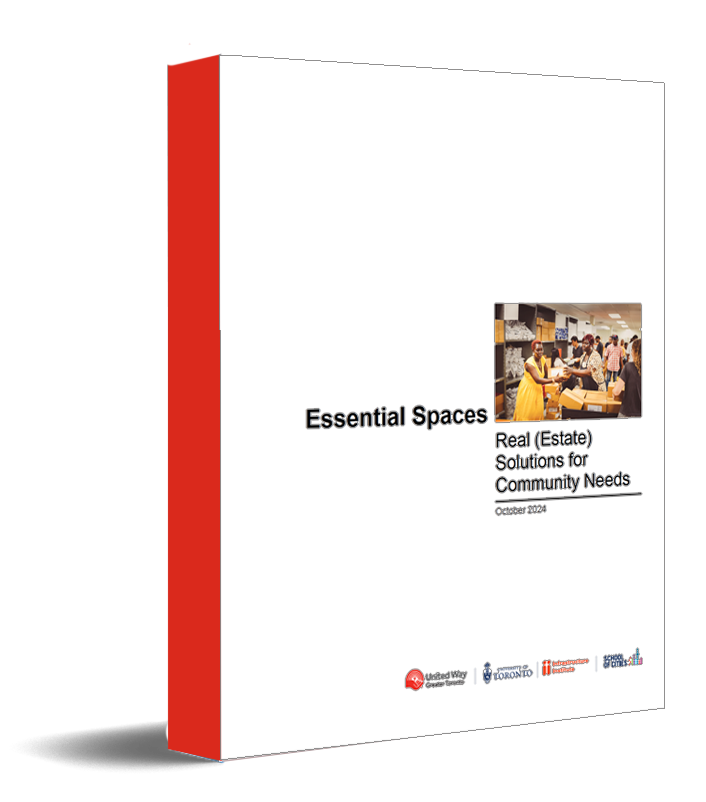New report in partnership with the Infrastructure Institute at the School of Cities, University of Toronto underscores need to protect future of community spaces
October 30, 2024 (Toronto, ON) – United Way Greater Toronto (UWGT) is working towards a more equitable GTA for all with the launch of a new Community Real Estate Initiative and the commitment to raise and invest over $100 million. Funds will support the creation of 10 more community hubs over the next 10 years and the development of new pathways for community organizations to acquire secure and sustainable space.
Unprecedented population growth is transforming the GTA and rising rental costs have created a housing affordability crisis that also affects essential community service spaces – 70 per cent of which are leased – pushing them out of neighbourhoods across Peel, Toronto, and York Region. Through this comprehensive initiative, UWGT aims to increase community real estate in neighbourhoods where services are at risk of displacement, or even closure. Other key elements of the initiative include:
- Distributing $1.8 million in grants and small capital funds to support pre-development costs such as feasibility studies;
- Exploring alternative financing such as community loans for organizations in the GTA to acquire or revitalize spaces; and
- Building community sector capacity with professional development programs in collaboration with the Infrastructure Institute, equipping agencies with the real estate expertise they need to navigate and manage these spaces long-term.
In partnership with the City of Toronto, work is underway for a new hub location in Toronto’s Parkdale. The goal of breaking ground on 10 new hubs also includes developing UWGT’s first community hubs in Peel and York Region, bringing together vital social services, healthcare, recreational spaces, and government services all under one roof.
“United Way Greater Toronto’s goal is to create, facilitate, and support community real estate infrastructure that sustains and empowers neighbourhoods across the region for the long-term,” says Ruth Crammond, Vice President of Community Infrastructure at United Way Greater Toronto. “In our fight against poverty, we are leveraging the power of philanthropy, partnerships, and people to ensure equitable community development and secure essential services, so everyone has the building blocks to thrive.”
Components of the Community Real Estate Initiative respond to recommendations identified in the recent study, Essential Spaces: Real (Solutions) for Community Needs, which among other findings also determines that occupancy costs for rented spaces across the GTA have increased as much as 57 per cent over the last decade.
This map examines the real estate landscape of the Greater Toronto Area’s (GTA) community services sector as of 2021. To view the map fullscreen or on a mobile device click here.
“The GTA’s community services sector is critical to supporting the well-being of residents, but its ability to do so depends on having stable, accessible spaces,” says Matti Siemiatycki, Director of the Infrastructure Institute at the University of Toronto. “Our research shows that there are serious challenges in securing suitable, affordable real estate. This announcement marks a significant step forward in creating a more coordinated, comprehensive approach to community real estate, ensuring that vital services have the space we all need.”
Research findings will be on display at an interactive exhibition held at Toronto’s Metro Hall Rotunda between October 28 and November 1, 2024, with future exhibits planned in Peel and York Region in the weeks to come.

Essential Spaces: Real (Estate) Solutions for Community Needs
Developed in partnership with the Infrastructure Institute at the School of Cities, University of Toronto, explores the role of community service organizations in meeting community needs, assesses the space-related risks confronting the sector – and proposes actions we can take today to ensure these valuable community assets continue to strengthen and enrich our neighbourhoods for generations to come.
Essential Spaces: Executive Summary
Essential Spaces: Full Report
For all media inquiries, please reach out to:
Katrina Manoukarakis
Account Manager,
BlueSky Communications
KManoukarakis@blueskycommunications.com
About United Way: As the largest non-government funder of community services in the GTA, United Way Greater Toronto reinforces a crucial community safety net to support people living in poverty. United Way’s network of agencies and initiatives in neighbourhoods across Peel, Toronto and York Region works to ensure that everyone has access to the programs and services they need to thrive. Mobilizing community support, United Way’s work is rooted in ground-breaking research, strategic leadership, local advocacy and cross-sectoral partnerships committed to building a more equitable region and lasting solutions to the GTA’s greatest challenges.
About the Infrastructure Institute: The Infrastructure Institute is a training, advisory and interdisciplinary research hub at the University of Toronto’s School of Cities. Our vision is to build local and global expertise in infrastructure planning, decision-making, and delivery. The Infrastructure Institute will transform the status quo of infrastructure delivery, refine public-private partnerships and propose innovations in project financing and funding tools. Our engagement work involves public presentations, exhibitions and events. We build awareness on current urban issues, convene discussion, and mobilize change.
About the School of Cities: The School of Cities is a unique multidisciplinary hub for urban research, education, and engagement creating new and just ways for cities and their residents to thrive. Based at the University of Toronto and in a fast-growing, culturally diverse, and economically dynamic urban region, the School of Cities supports leading scholars, practitioners, and community members spanning disciplines and lived experiences to co-create new understandings, policies, and practices.